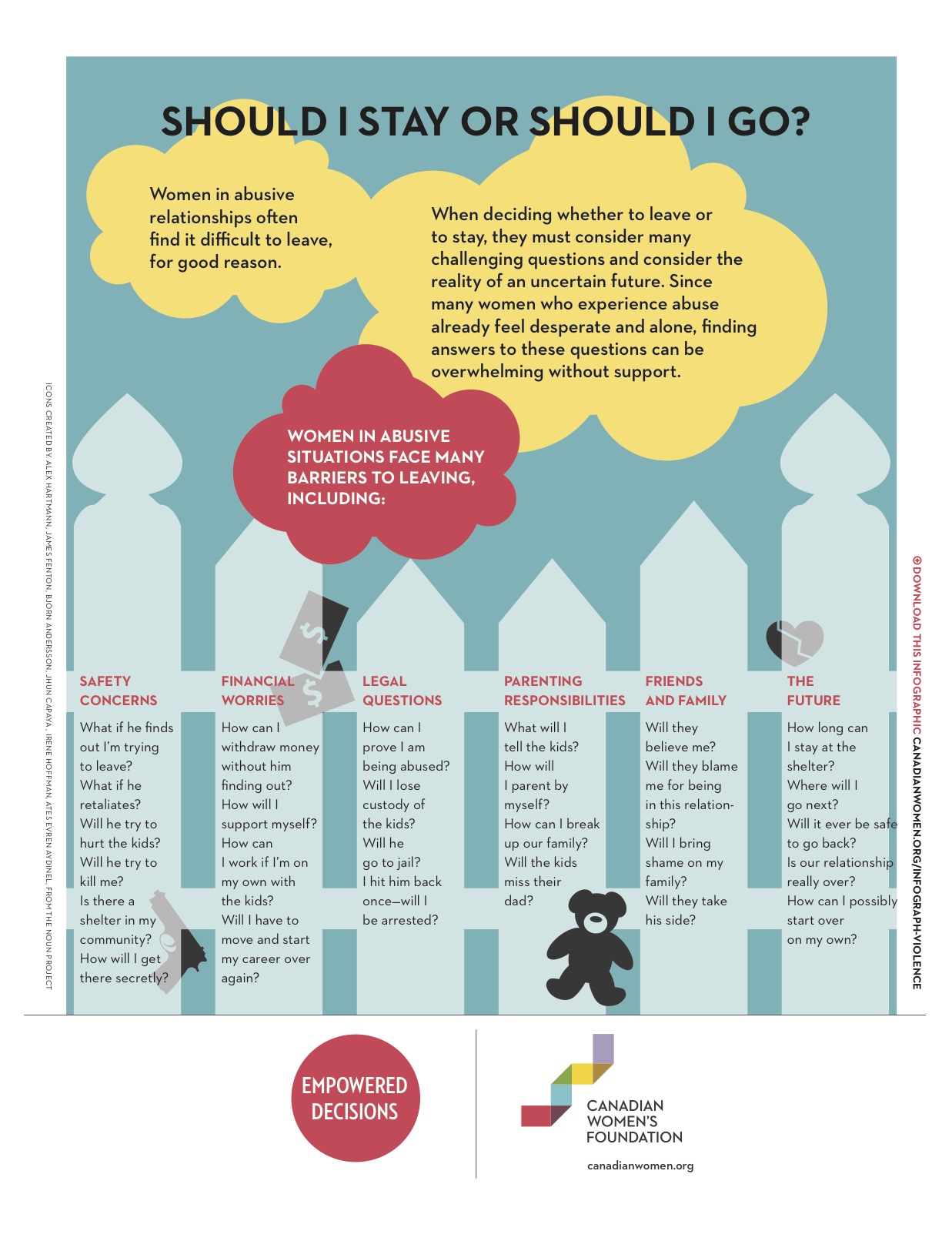Like this article? rabble is reader-supported journalism. Chip in to keep stories like these coming.
Abuse is never the victim’s fault. Abuse is the result of an imbalance of power. Most often it occurs when a man exerts power and control over his female partner. Abuse may be physical, sexual, financial, spiritual and psychological in nature. Often, women are subjected to multiple forms of abuse.
There are many warning signs that indicate a relationship is abusive. Often abusers exhibit more than one of these traits:
- Jealousy
- Controlling behaviour
- A need to get engaged or live together after knowing each other a very short time
- Unrealistic expectations that a partner should meet all of the abuser’s needs
- Isolating a partner from friends and family
- Blaming others for the abuser’s problems
- Using feelings to manipulate their partner
- Cruelty toward children or animals
- Degrading or manipulative sex
- Verbal abuse
- Rigid gender roles
- Threats of violence
- Breaking their partner’s possessions
- A history of abusing partners
These men are selective when it comes to dishing out cruel and violent behaviour. They know that they could never get away with giving a waitress a black eye because she spilled their coffee, but it’s absolutely acceptable to them to hit their intimate partner. They are making conscious choices about who their victims will be based on how society will react to their actions.
Society plays a large role in perpetuating intimate partner abuse because it tends to blame women for staying with their abusers rather than asking the question, why is he choosing to be abusive? The reasons women stay include not having a reliable job or source of income; being unable to find affordable housing or childcare; being unable to purchase enough healthy food to feed their children; and threats of increased violence if they try to leave. This means that women, and their children, are often living with abuse for long periods of time. Financial insecurity and fear of violence means that women, and their children, return to abusive partners several times before they are able to leave for good.
When a woman does finally decide to leave her chances of being killed by her partner increase nine fold. And, we know on average, every six days a woman is killed by her intimate partner in Canada. It’s at this crucial time that shelters play a pivotal role. Shelters offer a safer alternative to staying with relatives who may also be put at risk of violence, or paying for a hotel or motel room that can be traced through credit card use.
Women’s Habitat opened its doors November 2, 1978 and within two weeks it was filled to capacity. Since then, this emergency shelter has been busy expanding the essential roles it plays within the South Etobicoke community:
- In 1981, this shelter began offering group programs to former residents.
- The shelter helped develop the Assaulted Women’s Helpline in 1985.
- In 1989 Women’s Habitat expanded its physical space. The Outreach Centre purchased in 2006 allowed staff to offer more programs to women and their children.
- 2007 saw the development of a strategic plan focusing on a community development approach to working with women living in poverty. This is a significant milestone because a lack of money is a prime reason that women, especially women with children, stay in abusive relationships.
- Planting their first community garden in 2008 opened up the world of healing through nature as well as providing the opportunity to learn valuable skills.
- A health clinic established in 2010 meant physicians could see women and their children in the safety of the shelter.
- Women’s Habitat was awarded the Urban Hero Award from Toronto Community News in 2011.
- In 2014, the shelter launched its first Capital Campaign to renovate the shelter which was so successful that renovations were completed by June 2015.
On Wednesday, August 31, 2016 Women’s Habitat will host an Open House from 3 to 5 pm at The Outreach Centre, 140 Islington Avenue, to celebrate their latest accomplishment — a new, larger kitchen and more programing space. The centre will also highlight essential programs and services available to women and their children.
Silvia Samsa, Executive Director of Women’s Habitat believes, that “this generous support couldn’t have come sooner. Every year we served over 9,200 individual meals prepared in an apartment sized kitchen. It was clear that without a renovation we would no longer be able to provide these meals.”
Not only will The Outreach Centre be able to continue to provide what is often the only meal many of its visitors eat in a day, but it will allow the agency to expand its life skills and nutrition programing to include Cooking on a Budget and Healthy Eating for Kids workshops.
Assistant Deputy Minister Karen Chan and James Maloney, Member of Parliament for Etobicoke-Lakeshore will be among those celebrating the latest achievement that will help women and their children living with, and healing from, intimate partner violence.
For more information about Women’s Habitat and The Outreach Centre go to www.womens-habitat.ca.
Like this article? rabble is reader-supported journalism. Chip in to keep stories like these coming.



